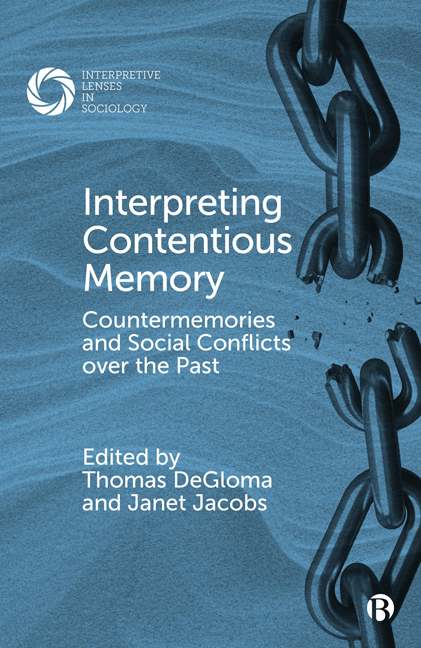Book contents
- Frontmatter
- Contents
- Series Editors’ Preface: Interpretive Lenses in Sociology – On the Multidimensional Foundations of Meaning in Social Life
- Notes on Contributors
- Acknowledgments
- 1 Introduction: Interpreting Contentious Memories and Conflicts over the Past
- PART I Interpreting Memories in the Social Dynamics of Contention
- PART II Racism, Exclusion, and Mnemonic Conflict
- PART III Genocide, Memory, and the Historicizing of Trauma
- Index
13 - Conclusion: Memory and the Social Dynamics of Conflict and Contention: Interpretive Lenses for New Cases and Controversies
Published online by Cambridge University Press: 20 January 2024
- Frontmatter
- Contents
- Series Editors’ Preface: Interpretive Lenses in Sociology – On the Multidimensional Foundations of Meaning in Social Life
- Notes on Contributors
- Acknowledgments
- 1 Introduction: Interpreting Contentious Memories and Conflicts over the Past
- PART I Interpreting Memories in the Social Dynamics of Contention
- PART II Racism, Exclusion, and Mnemonic Conflict
- PART III Genocide, Memory, and the Historicizing of Trauma
- Index
Summary
For over a century, scholars, writers, artists, and thinkers have been interested in and fascinated by the artifacts and meanings of memory. The quest to know and understand how memories are created, how they are coded and retained or lost, and how they shape identity and a sense of self is foundational to both psychological and sociological theory. While the tendency among many scholars and scholarly traditions has been to consider memory as an individual and personal domain, the notion that memory can also have a social, that is, collective component, was first articulated by Émile Durkheim ([1912] 2001) in the Elementary Forms of Religious Life. In that classic text, Durkheim describes the way in which group rituals and symbol systems represent the sacred in society and provide the means by which ancestral memory is transmitted across generations. Within this Durkeheimian paradigm, ritual cultures establish the social means and interactive contexts through which collective identity and a shared past is re-inscribed into social consciousness.
Following Durkheim's initial insights on ritualized memory as a distinctly social phenomenon, his student Maurice Halbwachs ([1952] 1992) laid the groundwork for the study of memory as a collective phenomenon and an element of social life. In The Social Frameworks of Memory, Halbwachs provides a sociological approach that links our understanding and experience of individual or personal memory to the social realm, and to collective meanings. He writes:
it is in society that people normally acquire their memories. It is also in society that they recall, recognize, and localize their memories. …It is in this sense that there exists a collective memory and social frameworks for memory; it is to the degree that our individual thought places itself in these frameworks and participates in this memory that it is capable of the act of recollection. ([1952] 1992: p 38)
Both in The Social Frameworks of Memory ([1952] 1992) and another text, The Legendary Topography of the Gospels in the Holy Land ([1941] 1992), Halbwachs elaborates on the role that myths, narratives, and symbol systems play in the transmission of memory, particularly as social structures such as the family, religion, and class relations inform the preservation and dissemination of remembrances of the past. It is also in these works that Halbwachs identifies the importance of landmarks, social locations, and iconography as social sites of memory.
Information
- Type
- Chapter
- Information
- Interpreting Contentious MemoryCountermemories and Social Conflicts over the Past, pp. 258 - 265Publisher: Bristol University PressPrint publication year: 2023
